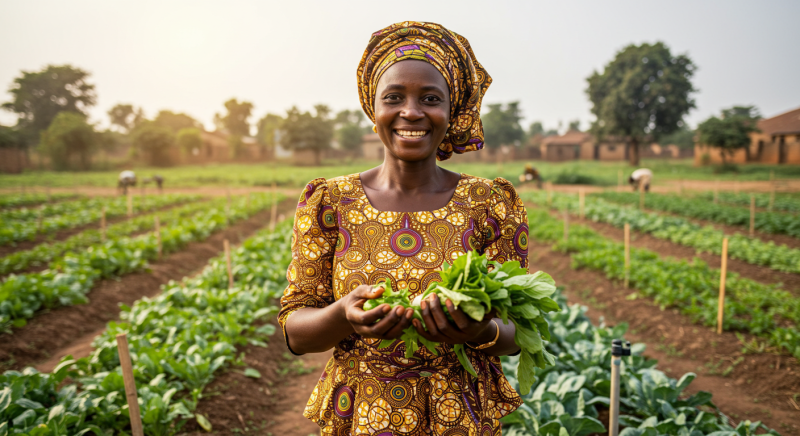“My Sister’s Farm Changed Our Lives—Here’s How You Can Transform Yours Too”
I still remember the day Aisha called me, her voice trembling with exhaustion. “I’m done,” she said. After years of struggling to keep her small poultry farm afloat, rising feed costs and loan rejections had crushed her spirit. But then, everything changed. A local NGO told her about a government grant for women farmers. Within months, she doubled her stock, hired two workers, and became the backbone of our family. Her story isn’t unique—thousands of Nigerians are unlocking opportunities through grants, and you can too. 
Key Takeaways
✅ 8 active grants for entrepreneurs, students, NGOs, and researchers.
✅ Step-by-step guides to avoid application pitfalls.
✅ Real success stories from Nigerians who secured funding.
✅ Free templates for proposals and budgets.
✅ How to identify scams and protect your data.
Why Grants Matter: A Lifeline for Nigerians
With 63% of Nigerians living in multidimensional poverty (NBS, 2022), grants aren’t just “free money”—they’re survival tools. Unlike loans, grants require no repayment, making them critical for startups, nonprofits, and innovators. Yet, a 2023 survey by BudgIT found that 72% of Nigerians don’t know how to apply for government grants. Let’s fix that.
Top 8 Nigerian Government Grants to Apply For
1. YouWiN! Connect Grant
Focus: Youth entrepreneurship (ages 18–35).
Funding: ₦1 million to ₦10 million.
Eligibility: Startups in agriculture, tech, manufacturing, or renewable energy.
Impact: Over 18,000 businesses funded since 2011 (SMEDAN).
How to Apply: Submit a business plan via youwinconnect.gov.ng.
Pro Tip: Judges prioritize ventures with clear revenue models. Include a 6-month financial projection.
Success Story: Lagos-based Chika Okafor used her ₦7 million grant to scale her organic skincare brand, now stocked in 23 stores nationwide.
2. NG-CARES Grant for Vulnerable Households
Focus: Poverty alleviation (post-COVID recovery).
Funding: ₦50,000 to ₦500,000.
Eligibility: Low-income earners, petty traders, artisans, and farmers.
Impact: 500,000+ beneficiaries as of 2023 (World Bank).
How to Apply: Visit your state’s NG-CARES office with a valid ID and business proof.
Pro Tip: Cooperatives receive higher funding. Partner with 5+ people in your trade.
Success Story: A Katsina rice processor, Musa Ibrahim, bought a milling machine and now supplies 10 local markets.
3. Bank of Industry (BOI) Youth Entrepreneurship Support (YES) Programme
Focus: Tech-driven startups and SMEs.
Funding: Up to ₦5 million at 5% interest.
Eligibility: Nigerians aged 18–35 with a registered business.
Impact: ₦12 billion disbursed to 4,000+ businesses (BOI 2023 Report).
How to Apply: Submit a feasibility study via boi.ng.
Pro Tip: BOI favors businesses using local raw materials (e.g., cassava processing).
4. Agricultural Transformation Agenda Support Program (ATASP-1)
Focus: Agri-business (rice, sorghum, cassava, and fish farming).
Funding: Up to ₦2 million in grants + training.
Eligibility: Farmers’ cooperatives and agri-entrepreneurs.
Impact: 60% increase in yields for 12,000 farmers (FMARD).
How to Apply: Register through participating state agricultural offices.
Success Story: Ogun State’s Tolu Adeyemi expanded her fish ponds from 3 to 20, earning ₦1.8 million monthly.
5. Nigeria Youth Investment Fund (NYIF)
Focus: Youth-owned businesses (all sectors).
Funding: ₦250,000 to ₦3 million (loan with 5% interest).
Eligibility: Ages 18–35 with a BVN and business registration.
Impact: 25,000+ beneficiaries since 2020 (NIRSAL).
How to Apply: Apply via nyif.nmfb.com.ng.
Red Flag: Never pay agents to “fast-track” your application—it’s free!
6. Tertiary Education Trust Fund (TETFund) Research Grants
Focus: Academic research (STEM, medicine, climate change).
Funding: Up to ₦50 million per project.
Eligibility: Lecturers and researchers in public institutions.
Impact: 1,200+ projects funded in 2023 (TETFund).
How to Apply: Submit through your university’s research office.
Pro Tip: Collaborate with international institutions to boost approval odds.
7. National Information Technology Development Agency (NITDA) Tech Innovation Grants
Focus: Tech startups (AI, blockchain, fintech).
Funding: ₦1.5 million to ₦15 million.
Eligibility: Registered tech startups with MVP (Minimum Viable Product).
Impact: 300+ startups funded in 2024 (NITDA).
How to Apply: Pitch via nitda.gov.ng/innovation-grants.
Success Story: Kano’s CodeGuru developed a Hausa-language coding app used by 50,000 students.
8. Fashion Industry Survival Fund (FISF)
Focus: Tailors, fashion designers, and textile SMEs.
Funding: ₦300,000 to ₦1 million.
Eligibility: Artisans with 2+ years of experience.
Impact: 15,000+ tailors supported in 2023 (ESP Nigeria).
How to Apply: Register via survivalfund.ng.
Pro Tip: Submit photos of your workshop and client testimonials for credibility.
Why Most Applications Fail (And How to Avoid It)
- Ignoring Geographic Quotas: Many grants allocate slots per state. Apply early if you’re in competitive regions like Lagos or Rivers.
- Weak Community Impact: Grants favor projects creating jobs or solving local problems (e.g., “My bakery will employ 10 displaced Borno women”).
- Poor Documentation: 80% rejections stem from incomplete CAC certificates, tax receipts, or ID proofs (NITDA).
Writing a Grant Proposal That Wins (Template Included)
The 5-Part Framework
- Problem Statement: “70% of Lagos schools lack clean water.”
- Solution: Your project’s unique approach.
- Budget: Use the “50-30-20 rule” (50% operations, 30% equipment, 20% emergencies).
- Sustainability: How the project continues post-grant.
- Community Impact: Quantify beneficiaries.
Free Template: Download Here

Avoid These 7 Application Mistakes
- Missing Deadlines: 60% of applicants submit late (NITDA).
- Generic Proposals: “I want to help people” vs. “I’ll train 100 youths in solar tech.”
- Ignoring Eligibility: e.g., Applying for agri-grants as an IT startup.
“I Got Funded”—Real Stories from Nigeria
- Chidi Nwosu (Enugu): Used the TETFund Research Grant to develop a low-cost water filter.
- Amina Lawal (Kaduna): Won ₦5 million from the Youth Investment Fund to expand her bakery.
5. Is This Grant a Scam? Red Flags
⚠️ “Pay to Apply”: Legitimate grants never ask for upfront fees.
⚠️ No Official Website: Cross-check URLs with .gov.ng domains.
⚠️ Vague Contact Info: Scammers use Gmail/Yahoo addresses.
Conclusion: Your Turn to Rise
Aisha’s farm now supplies eggs to three local schools. Her children are in university, and she mentors other women. Your breakthrough is one application away. Start today—update your CV, draft that proposal, and hit “submit.” The money exists. The opportunity is real. Will you take it?
Sources:
- National Bureau of Statistics (NBS) Poverty Report 2022
- BudgIT Civic Tech Survey 2023
- SMEDAN YouWiN! Impact Assessment
- World Bank NG-CARES Portal

